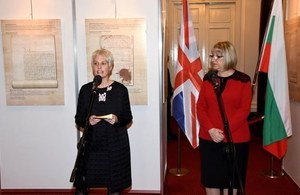British Embassy and Bulgarian Parliament celebrate Magna Carta
The Magna Carta exhibition, opened by the British Ambassador and the Parliament Speaker, highlights the principle that no one is above the law.

British Ambassador Emma Hopkins and Parliament Speaker Tsetska Tsatcheva open the exhibition
Today, 18 June 2015, the British Ambassador to Bulgaria Emma Hopkins OBE and the Speaker of Parliament Tsetska Tsatcheva opened a Magna Carta exhibition in the Bulgarian Parliament. The exhibition that is part of a comprehensive Magna Carta initiative run by the Embassy throughout 2015 will be displayed in Parliament until 26 June 2015. The exhibition includes 16 images that explain the history, impact and legacy of Magna Carta, which celebrates its 800th anniversary this year. The featured images were provided by the UK Parliament, the National Archives and the British Library. None have ever been seen in Bulgaria before.
Described as the greatest British export, along with the English language, Magna Carta is an international symbol of justice, freedom and democracy. It stands for human rights, free speech and personal liberties. Magna Carta sets the foundations for the rights we enjoy today. Its principles are echoed in the Declaration of Independence and the Bill of Rights, and has been used to argue for the freedom of the press and for extending the vote to ordinary people and to women. It has also become the foundation of the Universal Declaration of Human Rights.
Emma Hopkins OBE, British Ambassador to Bulgaria, said at the opening of the exhibition:
It is my great pleasure to open our exhibition celebrating 800 years since the sealing of Magna Carta. Magna Carta for the first time established that no one is above the law. It is a simple idea but one has shaped our understanding of democracy and responsible governance.
Reflecting on the history of Magna Carta can guide any democracy which seeks to uphold the rule of law. I hope that this exhibition will likewise prove inspiring to those who see it. Not least the Parliamentarians who are the cornerstone of democracy in all vibrant democracies across the world. As Bulgaria’s friend and partner, the UK will continue to do all it can to support the work of the Government and Parliament on the important issues of rule of law which matter so much to everyone.
Note to Editors
About Magna Carta
Magna Carta was a peace treaty sealed in 1215 between King John of England and his barons, who were in rebellion against his rule. The treaty established for the first time the principle that everybody, including the King, was subject to the law. The Great Charter contained sixty-three clauses, the most well-known of which was giving all English people the right to justice and fair trial.
Magna Carta was the first step on the journey towards parliamentary democracy and respect for individual rights, and has inspired people around the world for 800 years. Its principles are reflected in the United States Bill of Rights, the Universal Declaration of Human Rights and the European Convention on Human Rights.
In the 1964 trial for his life, Nelson Mandela cited Magna Carta as one of the key documents valued by democrats worldwide. And it continues to be cited – these days most often as a symbol of justice, freedom and democracy – in legal processes across the world.
What started out as a document of specific complaints from a group of barons has turned into an international symbol of liberty, without which we might not have the rights we value so much today.